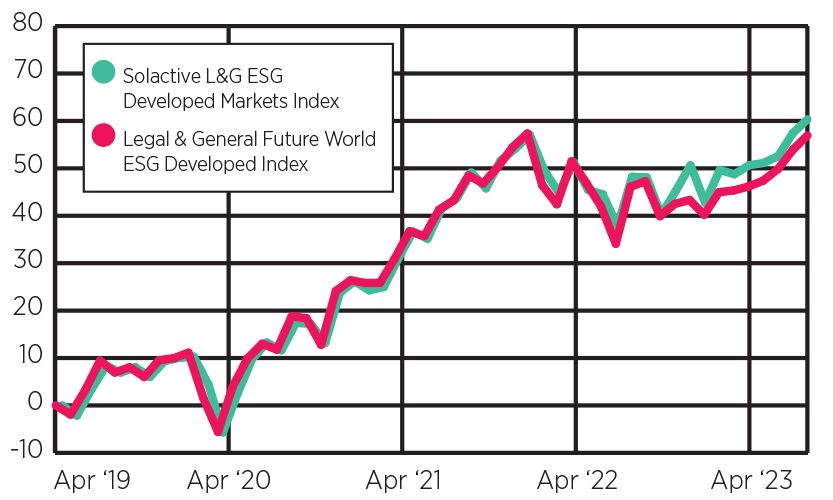In this series for ESG Clarity EU, Hargreaves Lansdown dives into ESG funds available in the UK and EU, analysing their investments, performance and ESG credentials.
For this latest article, Dominic Rowles takes a look at the Legal & General Future World ESG Developed Index.
The Legal & General Future World ESG Developed Index can act as the backbone for many responsible investment portfolios. It offers broad exposure to global stock markets while being mindful of ESG issues.
The fund tracks the Solactive L&G Enhanced ESG Developed Index, which is made up of more than 1400 companies operating across a range of sectors – from technology and financials to healthcare and industrials.
The index increases investments in companies that score well on a variety of ESG criteria – from the level of carbon emissions generated, to the number of women on the board and the quality of disclosure on executive pay. If companies score poorly on these measures the index reduces exposure.
The advantage of reducing companies that score poorly, rather than selling their shares completely, is that the team can engage to help them improve. An increased investment in exchange for improvement on various factors is a good incentive, so investors’ money makes a positive difference.
The fund also aims to reduce emissions by 50% compared with the broader global stock market, and thereafter achieve at least a 7% reduction in carbon emissions per year until 2050. The goal is to align the fund with the Paris Agreement, which aims to limit the temperature rise caused by global emissions to 1.5°C above pre-industrial times.
Sin stocks in
This fund won’t be right for everyone though. Its objective of performing in line with the broader global stock market means its exclusions are relatively light touch compared with many other funds in the responsible investment space.
Violators of the UN Global Compact (a UN agreement on human rights, the environment, labour and anti-corruption) are excluded, as are companies involved in tobacco and those making controversial weapons (like cluster bombs and anti-personnel mines).
The fund also avoids companies that earn more than 20% of their revenues from thermal coal and oil sands. However, the fund doesn’t exclude other ‘sin stocks’, like alcohol, gambling and adult entertainment.
When LGIM speaks, companies listen
Legal & General Investment Management (LGIM) is predominantly a passive investor, but I am impressed with the extent to which they have woven ESG into their culture. This fund incorporates the firm’s ‘Climate Impact Pledge’, which is its commitment to assess and engage with the world’s largest companies on how well they manage the implications of climate change. LGIM is a global investment management group, looking after more than £1tn of investors’ money. When it speaks, companies tend to listen. But those that consistently show a lack of awareness of climate change, or don’t respond positively to engagement, are sold from the fund.
In 2022, Invitation Homes, a Real Estate Investment Trust, and cement maker China Resources Cement were removed from the portfolio because of a lack of climate awareness and disclosure. Meanwhile, following five years of engagement, logistics and financial services company Japan Post was reinstated after providing more detailed emissions data and making commitments to reduce its emissions over time.
The fund’s tracked its index well since launch in April 2019, and I expect it to continue to do so. LGIM is an extremely experienced tracker fund manager and it’s got the resources and expertise to track indices closely, and the scale to keep charges to a minimum.
Closely tracked performance since launch

Source: Lipper IM to 31/07/2023
